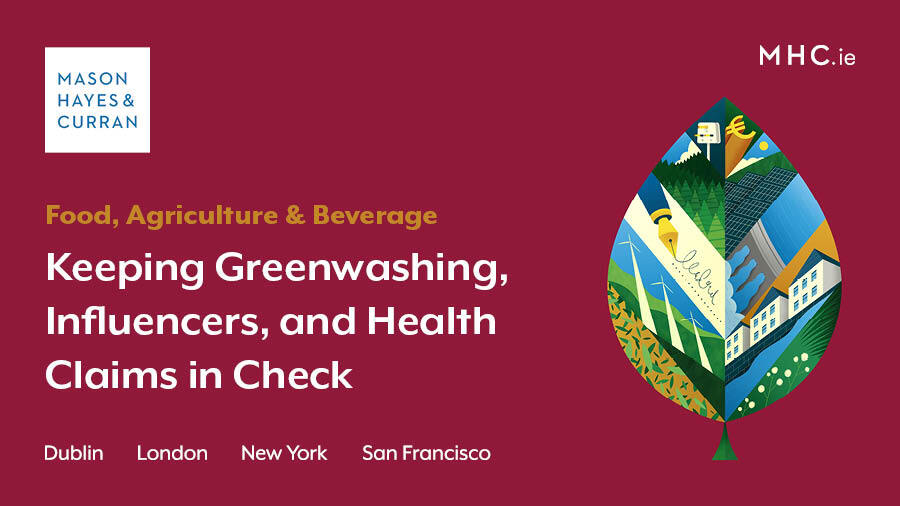Keeping Greenwashing, Influencers, and Health Claims in Check
Advertising Update

The ASAI has recently further clamped down on influencers, and sustainability and health claims. Our Technology team discusses some recent ASAI decisions, which might make advertisers think twice about their campaign and promotion strategies.
In the competitive landscape of marketing, drawing consumer attention to an advertisement campaign is a powerful tool in business. To achieve this, businesses are increasingly harnessing the potential of influencer marketing, and in-vogue topics like sustainability and healthy living to amplify their reach. However, advertisers must tread lightly, as the Advertising Standards Authority of Ireland (ASAI) continues to monitor complaints on the labelling, substantiation, and impact of marketing communications.
Set up and funded by the advertising industry, the ASAI is a self-regulatory body that seeks to ensure responsible, honest and transparent marketing. Advertisers must heed its guidelines and standards, or risk having a formal complaint upheld against their advert.
Influencers and labelling
The ASAI’s approach to influencer regulation is getting stricter, particularly when it comes to influencers labelling their marketing communications. For example, a complaint was recently upheld against a well-known takeaway chain for the failure by an influencer to label a promotional sketch as a marketing communication. There was no formal contract between the takeaway chain and the influencer. However, the ASAI noted that the influencer who filmed the sketch was given payment and food in return for his video. Therefore, it amounted to an unlabelled marketing communication and breached the ASAI Code.
However, not any label will do. When briefing an influencer, advertisers should ensure that any advertisement is clearly, visibly and legibly labelled with satisfactory hashtags. A cautionary tale arises from a recently upheld complaint against a company selling bottle openers on not adhering to hashtag guidelines. In its response to the ASAI, the company noted that the influencer was briefed to include ‘#Collab’ on any promotion to show that it was a paid collaboration. However, this instruction was deemed to have fallen short, as the ASAI previously determined that the use of ‘#Collab’ was insufficient. The ASAI also reasoned that despite ‘#SP’ being partly used on some Instagram stories, there was no contrast between the colour of the hashtag and the background colour. As a result, the label was not sufficiently clear to consumer viewers.
Greenwashing
As sustainability and healthy living increase in popularity with consumers, advertisers have been using these trends in their advertising campaigns.
The ASAI upheld a flurry of complaints on a recent advertising campaign promoting Irish dairy. One advertisement claimed that Irish dairy had one of the lowest dairy carbon footprints in the world. Following investigation, it was revealed that this claim was based on outdated figures from a study done in 2010. When challenged, the advertisers could not give the source of their claims, nor could they show that Ireland’s ranking compared to the global average carbon footprint per litre of milk had not changed in the past 13 years. The claims, made on its website and in press, radio, and television adverts, were found to be in breach of several provisions of the ASAI Code under section 4 (Misleading Advertising) and section 15 (Environmental Claims). Consequently, the ASAI asked this body to withdraw their claims.
Interestingly, the complaints were also submitted to the ASAI over an advertising slogan for a dairy alternative oat drink, “It’s like milk but made for humans”. Various objections were raised regarding the advert, contending it implied that:
- Milk was not suitable for human consumption
- The product was superior to cow’s milk, and
- It provided no information as to how the product was ‘like milk’
The ASAI only partly upheld the complaints, agreeing that “made for humans” may mislead or exploit the trust of consumers, or diminish milk's place as part of good dietary practice. The ASAI did not endorse the other two complaints, ruling that the slogan referred to suitability rather than superiority. In addition, the ASAI held that the product was ‘like milk’ as it could be used for the same purposes.
At a European level, the European Consumer Organisation (BEUC) recently lodged a complaint with the EU Consumer Protection authorities against misleading commercial claims about the recyclability of water bottles. The complaint relates to claims of “100% recyclable”, 100% recycled and the use of green imagery, on the basis that the claims were either inaccurate, too vague and/or insufficiently substantiated.
Healthy living
In the realm of promoting good diets, advertisers must be alive to how their ads, even comedic or satirical ads, may be perceived. The ASAI recently ruled on a TV ad by a fast-food chain, upholding a complaint on the portion size of food shared by a pair of actors. Following an estimate by an ASAI Executive, the depth of the bucket of fried chicken in question was estimated to hold more than the visible 6 pieces. As a result, this could potentially, as per section 8.4 of the ASAI Code, “encourage or condone excess consumption” of fast food.
Hollow and exaggerated health claims have also been on the ASAI’s recent radar. A pizza chain branch faced an upheld complaint, from an advert on its Facebook page which read “Pizza goes straight to your muscles” together with a link to its website. The ASAI found that although this was a health claim, it did not appear on the ‘EU Register of Nutrition and Health Claims’. In the absence of any listed authorised health claim or response from the advertiser, the complaint was upheld on foot of the ASAI Code, section 3.10 (Failure to respond), section 4 (Misleading Advertising) and section 8.8 (Nutritional and Health Claims).
Conclusion
These recent ASAI decisions reiterate the need for advertisers to carefully navigate influencer marketing. It is recommended that advertisers proceed carefully when aligning their products and advertising strategies with green, sustainable, and healthy diet narratives, ensuring to have substantive sources and evidence to back up any claims. To ensure ethical and authentic engagement, it is crucial that advertising practices do not seek to exploit consumers or use unsubstantiated greenwashing tactics for commercial gain.
Stakeholders should also be aware that the European Council recently approved Directive 2022/0092 (COD) on Empowering Consumers for the Green Transition. This directive bans the use of greenwashing and misleading green claims and labels without proof of their veracity. See the press release. Once published in the Official Journal of the European Union, this directive will enter into force on the twentieth day after its publication. This directive will work together with the Green Claims Directive, which is at the committee stage in the European Parliament. Businesses should take note of the forthcoming laws, as the stakes will be higher, and the consequences more severe if they are violated.
For more information and expert guidance, contact a member of our Technology team.
People also ask
What is the EU regulation for greenwashing? |
The Empowering Consumers for the Green Transition Directive, agreed in January 2024 in the European Parliament, now includes common greenwashing tactics in the list of unfair commercial practices. The Directive will require businesses to substantiate their environmental claims with the support of credible evidence. |
What are the rules for influencers in Ireland? |
Please see our article “New CCPC Guidelines for Social Media Influencer Advertising”. |
The content of this article is provided for information purposes only and does not constitute legal or other advice.
Share this:


